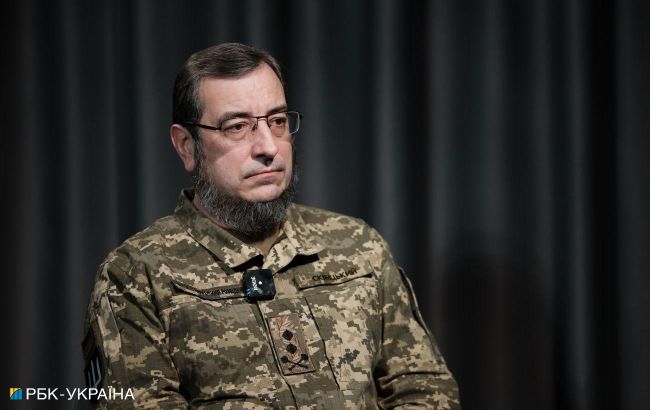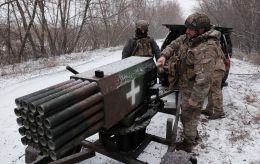Ukraine's intelligence rep Skibitskyi on threat to Chasiv Yar, challenges in May, and Russia's offensive plan
 Vadym Skibitskyi, representative of Defense Intelligence of Ukraine (Vitalii Nosach, RBC-Ukraine)
Vadym Skibitskyi, representative of Defense Intelligence of Ukraine (Vitalii Nosach, RBC-Ukraine)
Vadym Skibitskyi, a representative of the Defense Intelligence of Ukraine, gave an interview to The Economist. In the interview, he does not rule out that the loss of Chasiv Yar is only a matter of time, calls May a difficult month for Ukrainians, and tells where Russia could still launch an offensive in case of an advance in Donbas.
Read Skibitskyi's main statements on RBC-Ukraine below.
Russia's primary task
According to the representative of the Defense Intelligence, Russia is primarily pursuing its plan to "liberate" all eastern Donetsk and Luhansk regions of Ukraine. This is a task that has been unchanged since 2022.
He says the occupiers have been ordered to take at least something before Moscow's pompous Victory Day celebrations on May 9, or, failing that, before Vladimir Putin's visit to Beijing a week later. The speed and success of the advance will determine when and where the Russians strike next.
"Our problem is very simple: we have no weapons. They always knew April and May would be a difficult time for us," says Skibitskyi.
'Losing Chasiv Yar is only a matter of time'
The Economist writes that the high-altitude stronghold of Chasiv Yar is a matter of concern for Ukraine, as its loss opens the way to the last major cities in the Donetsk region.
Skibitskyi says it's probably only a matter of time before the city falls, just like Avdiivka, which was bombed to the ground by the Russian army in February.
"Not today or tomorrow, of course, but all depending on our reserves and supplies," adds the DIU representative.
Russia preparing offensive in Kharkiv and Sumy regions
Skibitskyi suggests that Russia is preparing for an offensive in the Kharkiv and Sumy regions in the northeast of Ukraine. According to him, the timing of this offensive depends on the strength of Ukraine's defense in the Donbas. He assumes that the main enemy offensive will begin in late May or early June.
Skibitskyi said that the aggressor country has a total of 514,000 ground troops involved in the Ukrainian operation, which exceeds the 470,000 estimate given last month by NATO's top commander, General Christopher Cavoli.
According to a Ukrainian intelligence source, Russia's northern grouping, based on the border with Kharkiv, currently has 35,000 troops but is likely to be increased to 50,000-70,000. Russia is also forming a reserve division (i.e., 15,000 - 20,000 troops) in central Russia, which it can add to the main force. However, this is "not enough" for an operation to capture a large city, the major general said. The Economist notes Western military officials share the same opinion. But smaller-scale operations are possible.
"A quick operation to come in and come out: maybe. But an operation to take Kharkiv, or even Sumy city, is of a different order. The Russians know this. And we know this," says Skibitskyi.
Three-layer destabilization plan
May will be a key month, the major general says, as Russia is implementing a three-layer plan to destabilize the country. The main factor is the military. After the delay in US aid, the weapons will take weeks to reach Ukrainian positions. The intelligence officer notes that it is unlikely that it will be able to match Russia's stockpiles of shells or provide effective protection against the low-tech, destructive guided aerial bombs that Russia attacks Ukraine with almost daily.
The second factor is Russia's disinformation campaign in Ukraine aimed at undermining Ukrainian mobilization and the political legitimacy of Volodymyr Zelenskyy, whose presidential term is set to expire on May 20. Skibitskyi says that although the Constitution clearly allows for its indefinite extension in wartime, his opponents are already highlighting the president's vulnerability.
The third factor, according to the DI representative, is Russia's relentless campaign to isolate Ukraine on a global scale. He says that "they will be shaking things up whichever way they can."
Mobilization in Ukraine
Since December, the situation has improved slightly, but Skibitskyi is reluctant to declare an end to the state of emergency. Ukrainian officials are concerned that the next wave of mobilized will lead to unmotivated soldiers with poor morale, the media says. The only saving grace, according to the general, is that Russia is facing similar problems. Its army is unrecognizable from the professional corps that started the war. But Russia has yet to throw them into battle, stretching Ukraine's already stretched defense capabilities.
On Ukraine's victory and negotiations with Russia
Skibitskyi believes that Ukraine cannot defeat Russia on the battlefield alone. Even if it were able to push Russian troops back to the borders - and this is an increasingly remote prospect - it would not end the war. He believes such wars can only end with treaties.
The intelligence officer notes that both sides are currently trying to take the most favorable position before potential negotiations, but meaningful talks may not begin until the second half of 2025. Until then, Russia will face serious headwinds.
Russian military production capacity has expanded, but will reach a plateau in early 2026 over a lack of materials and engineers, the major general says. According to him, both sides may eventually face a shortage of weapons, "but if nothing changes in other respects, Ukraine will run out first."
'The Russians will take the Baltics in seven days'
According to Skibitskyi, the biggest unknown factor in the war is Europe. If Ukraine's neighbors do not find a way to increase defense production to help fight Russian aggression, they too will eventually be in Russia's crosshairs.
He downplays NATO's Article 5 (if a NATO member is attacked by armed force, all other Allies shall consider the attack as an attack against them all and shall take such measures as they deem necessary to assist the attacked member - ed.) and even the presence of NATO troops in countries bordering Ukraine. This article, in his opinion, may not be effective in practice.
"The Russians will take the Baltics in seven days. NATO’s reaction time is ten days," Skibitskyi says.
At the same time, he notes that Ukraine's bravery and sacrifice have given Europe a multi-year head start, eliminating the immediate threat of the once-fearsome Russian airborne troops and marines for at least a decade.
Now, according to the DIU representative, the question is whether Europe will return the favor by keeping Ukraine in the game.
"We will keep fighting. We have no choice. We want to live. But the outcome of the war [...] isn’t just down to us," Skibitskyi summarized.

